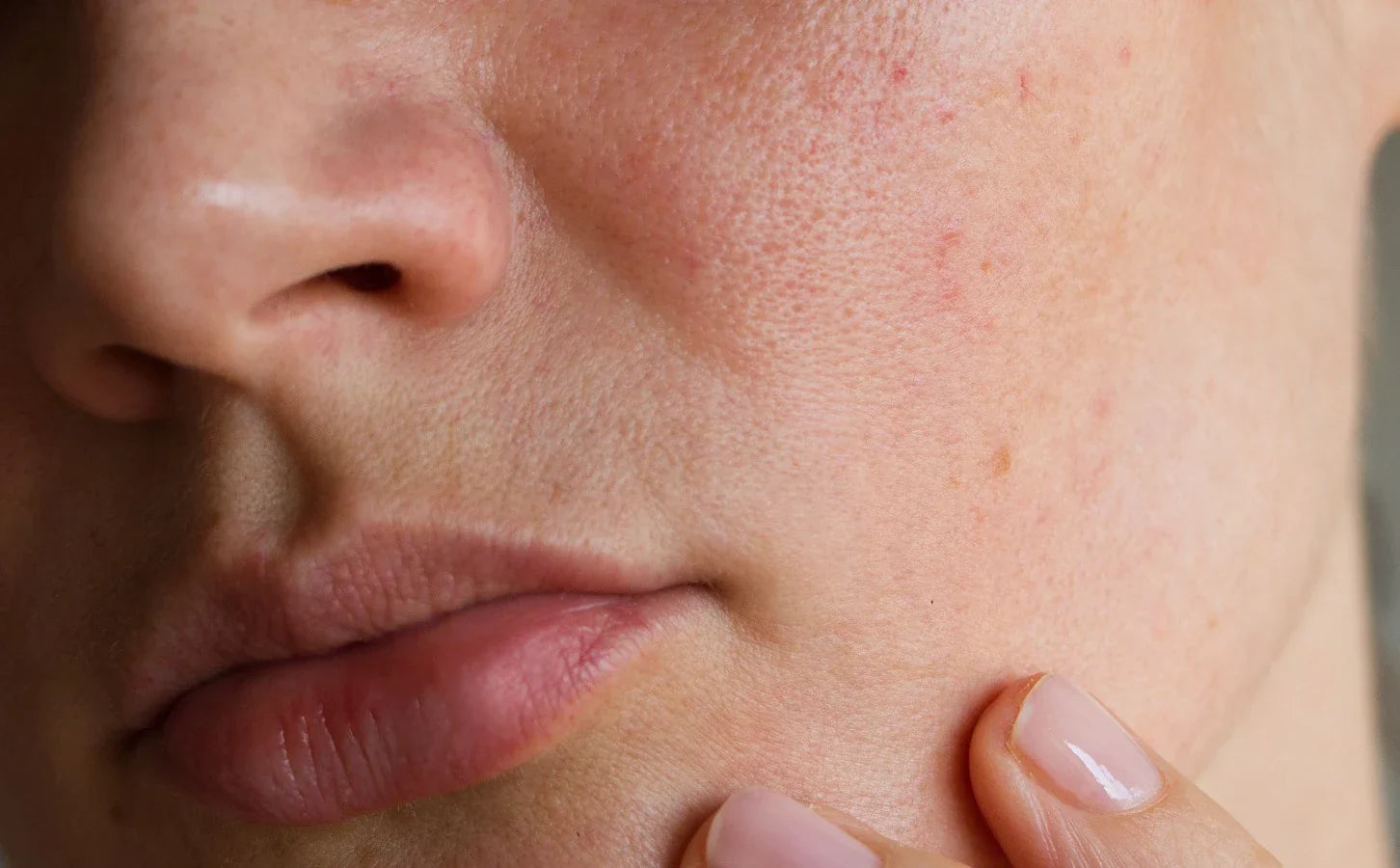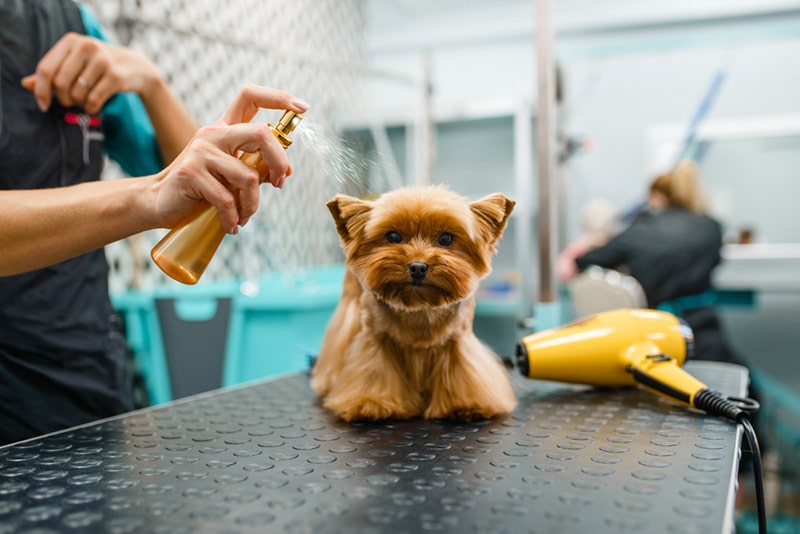
Rosacea and facial dandruff are usually ‘bilateral and symmetric’ but it is possible to have greater involvement on one side of the face. I was asked this question by a reader and want to share my answer.
Hello Dr. Bailey, I only get rosacea and seborrhea dermatitis flare ups on my left cheeks. Can you tell me why I only get it on one side of my face? Also, my doctor prescribed for me Metrogel, Desonide lotion (corticosteroids), and Ketoconazole cream (antifungal). Can you please explain the order and give me the steps for applying all the above with the other products on your website that you recommend as the best skin care for rosacea and facial dandruff such as Calming Zinc, Green Tea Antioxidant Skin Therapy, Daily Moisturizing Face Cream and my zinc oxide sunscreen. Thanks, Mimi
Hello Mimi,
It is possible to have unilateral rosacea, but it’s unusual, so I always look for a different diagnosis that might be masquerading as rosacea. This is because we think of rosacea and seborrhea as being skin conditions that come from some as-yet-unknown internal predisposition. This means that we expect them to manifest on your skin bilaterally (on both sides of the body).
Conditions that can make rosacea and facial dandruff worse on one side of the face
Rashes that cause redness, flaking and pustules can cause additive inflammation to your face. Some of these can be asymmetric.
The common causes of asymmetric facial redness and inflammation include:
allergic contact dermatitis (an allergic reaction to something touching your face such as eyeglasses, a phone etc),
sun induces phototoxic or allergic dermatitis (especially if you are on a medicine that creates sun sensitivity such as NSAID, high blood pressure medicine etc.),
tinea faciei (a fungal infection), and
demodex mites (everyone has some mites in the pores but occasionally they can create a lot of inflammation).
Sun reactions are important to consider since here in the United States the left is the driver’s side of a vehicle. Sun exposure-induced rashes like photo-drug eruptions or polymorphous light eruption are high on my list of suspicions given that you state the left side is the problem. Also, sun can trigger rosacea. Ask your doctor about the conditions that I just listed to see if any of them may be causing the asymmetry of your facial redness.
Treatment for facial redness on just one side of the face
The tinea (fungal skin infection) may respond to the topical ketoconazole cream, but often tinea faciei requires oral antifungal treatment.
Demodex mites, on the other hand, need a completely different treatment. Topical Soolantra is the only FDA approved cream for this problem. Some doctors use oral ivermectin. I have had success with the economical off-label use of topical permethrin.
Mineral SPF 30 or higher sunscreens help prevent UV sun rays from triggering rosacea and sun induced skin problems. In fact, I always recommend that patients with rosacea wear a mineral zinc oxide sunscreen every day. I include a great mineral sunscreen in my Rosacea Therapy Skin Care Kit. This kit contains the products that I also use for facial seborrhea, which as you mention, commonly exists with rosacea. Treatment for the other conditions that I mentioned above require more medical evaluation on the part of your dermatologist.
How do you layer skin care products when you have rosacea
I always recommend layering products from water based to oil/occlusive based and in the order of the 4 skin care steps of Complete Skin Care™: CLEANSE CORRECT HYDRATE PROTECT™
This is how I layer the rosacea and facial seborrhea skin care routine products in my dermatology practice:
CLEANSE: Wash with Calming Zinc face wash bar alternating with a pH balanced gentle cleanser such as the Extremely Gentle Cleanser in the Rosacea Kit.
CORRECT: I have my patients apply Green Tea Antioxidant Skin Therapy to the entire face. This antioxidant medical-grade product helps to calm inflammation to control both rosacea and seborrhea. It is a thin water-based product and I have patients apply it before prescription products in my practice.
I let the Green Tea Antioxidant Skin Therapy dry to the touch then they layer the other Rx products such as Metrogel and Ketoconazole Cream. This would need to be approved by your treating physician since your other medicines are prescription. In my practice, I only use the mild cortisone if the skin is actively red and symptomatic, and for no longer than two weeks.
HYRATE: We layer a good moisturizer over the treating products to help a perturbed skin barrier heal. It is important to know that both rosacea and seborrhea cause damage to the skin barrier. This makes a moisturizer with good barrier replenishing ingredients an important component of the skin care routine. I use the Daily Moisturizing Cream in the Rosacea Kit because it contains ceramides, squalane and phospholipids similar to those naturally present in the skin barrier, called the stratum corneum of the epidermis.
PROTECT: Zinc oxide sunscreen goes on top during the day when UV rays are a risk. Remember, some UV rays can penetrate glass to trigger rosacea and sun sensitive skin problems. My top choice facial sunscreen for sensitive skin is my Sheer Strength Pure Physical Matte Tinted SPF 30+ Sunscreen (this is my personal favorite!). Mineral zinc oxide SPFs are non-irritating for sensitive skin and provide superior protection compared with chemical sunscreens.
Mimi, I also want to acknowledge that the three medicines you are on create a lot of layers. In my practice, when rosacea and seborrhea are under control, I have my patients stop using the cortisone first. In another month or so I have them stop the ketoconazole. At that point, the routine is much simpler.
Dermatologist’s skin care kit to heal rosacea and facial seborrheic dermatitis
The products in the skin care routine that I just described are all grouped into a kit that I call my Rosacea Therapy Skin Care Kit. It helps control both rosacea and seborrhea and is the perfect skin care routine to keep both conditions in remission. This is a Complete Skin Care Routine built from compatible medical-grade products and ingredients to enhance success.
I use my 35 years of dermatology experience to cover all the bases so that you don’t have to. This routine calms what triggers these skin problems and provides healing products so that the skin can recover. Like a trip to the dermatologist without the trip! – Dermatologist Dr. Cynthia Bailey
Mimi, thank you for sending in a great question that demonstrates how complex seemingly common skin problems can be.
Click here to learn more about the Rosacea Therapy Skin Care Kit.
Warm Regards,
Cynthia Bailey MD, Dermatologist
Disclaimer: Please realize that availing yourself of the opportunity to submit and receive answers to your questions from Dr. Bailey does not confer a doctor/patient relationship with Dr. Bailey. The information provided by Dr. Bailey is general health information inspired by your question. It should not be a substitute for obtaining medical advice from your physician and is not intended to diagnose or treat any specific medical problem (and is not an extension of the care Dr. Bailey has provided in her office for existing patients of her practice). Never ignore your own doctor’s advice because of something you read here; this information is for general informational purpose only.






